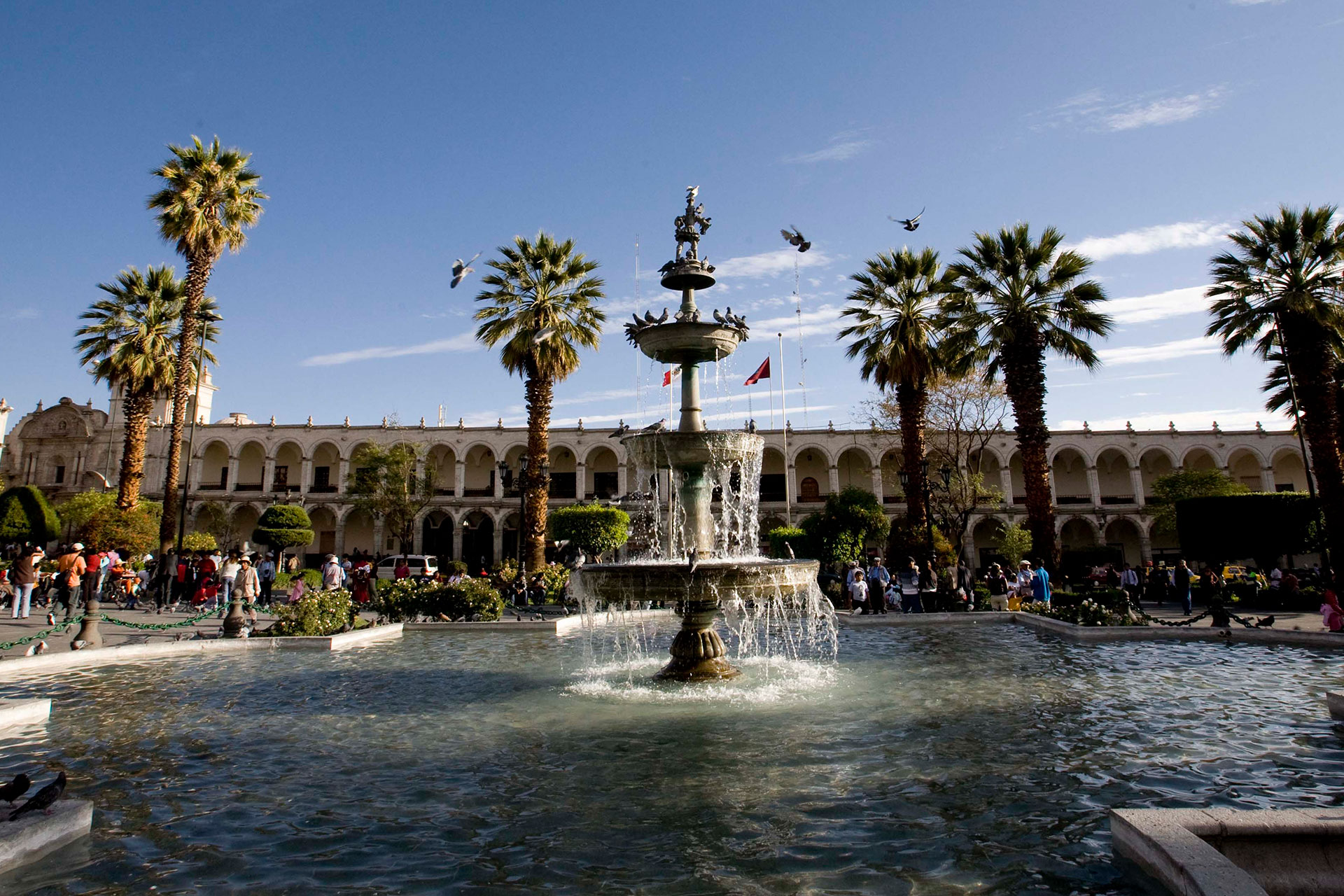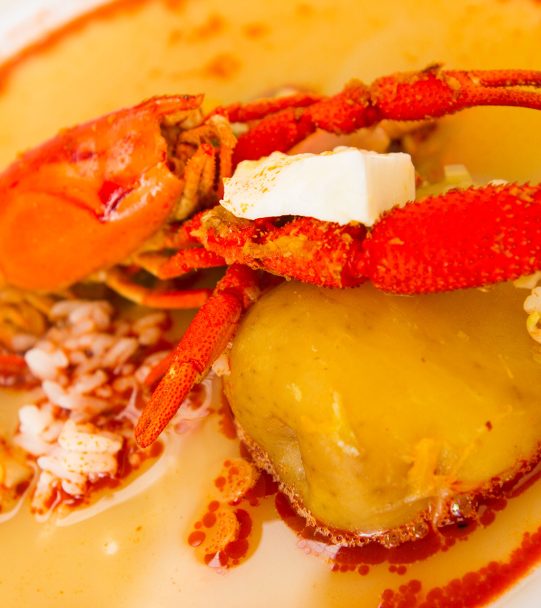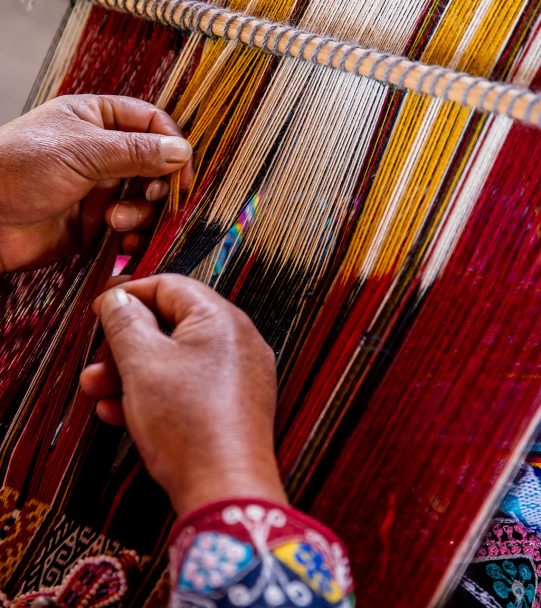Arequipa
Arequipa, in the south of Peru, awaits you with an irresistible combination of landscapes, culture and flavor. Surrounded by volcanoes and imposing canyons, this region has it all from colonial architecture made of white sillar, nationally recognized cuisine and a strong local identity. Its capital, Arequipa, declared a World Heritage Site by UNESCO, preserves traditions and dynamic urban life, and is the epicenter from where the routes to the main attractions of the department depart. Arequipa offers history, warmth and authenticity in every corner.
Connectivity
You can reach the department of Arequipa by road by private vehicle or bus through routes that connect Arequipa, its capital city, with main or nearby cities such as Puno, Tacna , Ica and Lima, the trip takes between 5 and 19 hours respectively. For those who prefer to fly, the Alfredo Rodriguez Ballon International Airport in the city of Arequipa, offers regular flights to Lima and Cusco, facilitating quick and comfortable arrival for visitors.
Arequipa
Subscribe to receive news about Caminos Andinos
Temperature
From 10 °C to 25 °C
Weather
Temperate and dry
More destinations
Activities and attractions
The department of Arequipa invites you to live an adventure where history, nature and tradition coexist with their own strength. Tour its capital with the same name, the “White City” declared a World Heritage Site by UNESCO, with its historic center built with volcanic stone called sillar and immerse yourself in gems like the Monastery of Santa Catalina and the Museum of Andean Sanctuaries. Admire the Wititi dance in the Colca and experience the contrast between its volcanoes, nature reserves and Pacific beaches. Relax in hot springs and be amazed by the flight of the condor in the Colca Canyon. Celebrate colorful festivities, enjoy one of Peru's most potent cuisines and taste homegrown pisco in its valleys. In Arequipa, every corner proudly preserves its Andean character, inviting you to a cultural, natural and gastronomic experience that you will never forget.
Arequipa Cathedral Basilica
PHOTO: PROMPERÚ
Misti Volcano and Arequipa countryside
PHOTO: PROMPERÚ
Salinas Lagoon, Arequipa
PHOTO: PROMPERÚ
Viewpoint of the Cruz del Cóndor, Arequipa
PHOTO: PROMPERÚ
Beaches of Mollendo, Arequipa
PHOTO: PROMPERÚ
La Calera hot springs in the district of Chivay, Colca Valley.
PHOTO: PROMPERÚ
Albizuri Islands
PHOTO: PROMPERÚ
Sibayo Community
PHOTO: PROMPERÚ
Wititi, Cultural Heritage of Mankind
PHOTO: PROMPERÚ
Discover what we do
-
-
CULTURE
Arequipa: Andean cities with colonial heritage
The historical center of Arequipa, declared a UNESCO World Cultural Heritage Site, stands out for its colonial architecture built in white sillar, a volcanic stone that gives it its characteristic shine, you can learn more about the extraction of this stone in the route of the sillar. In the historic center tour the imposing Cathedral in the Plaza de Armas, explore the Monastery of Santa Catalina, a 16th century citadel, and admire the mestizo baroque facade of the Church of the Company of Jesus. Visit the Museo Santuarios Andinos, home of the Juanita mummy, and enjoy the traditional charm of the San Lazaro neighborhood. A journey to the historic heart of southern Peru.
The Wititi Dance: UNESCO World Heritage Site
The Wititi dance, declared a World Heritage Site by UNESCO, is one of the most representative expressions of the Colca Valley. With colorful costumes, accompanied by the musical sound of trumpets, tarolas, bugles, and vigorous steps, this dance symbolizes the courtship and identity of the Andean people of Arequipa. Witnessing it in local festivities is a unique experience that connects the visitor with the living force of the tradition of southern Peru.
-
-
NATURE
Misti and Chachani Volcanoes: Mountains, volcanoes and snow-capped mountains
Arequipa invites you to live a unique experience next to the giants that dominate its horizon. The imposing Misti Volcano, icon of the city, challenges you with trekking routes that reach 5,800 meters above sea level, rewarding you with stunning views of the valley and the white city. Its perfect shape makes it a postcard not to be missed. Next to it, the majestic Chachani, over 6,000 meters, is ideal for adventurers looking to conquer the altitude in an accessible 4×4 route, surrounded by Andean landscapes and extreme nature.
Colca Canyon and Valley: Exploration and Birdwatching Trails
The Colca Valley surprises you with its Andean landscapes, traditional villages and more than 8,000 pre-Inca terraces, which reflect the ancestral agricultural ingenuity. Here you can relax in hot springs, visit colonial churches and experience the local culture in every corner. Beyond, the Colca Canyon impresses with its depth of more than 4,000 meters, being one of the deepest on the planet. From the Cruz del Condor viewpoint you can observe the free flight of this emblematic Andean bird in an environment of breathtaking beauty.
Salinas and Aguada Blanca National Reserve
The Salinas y Aguada Blanca National Reserve invites you to discover unique high altitude landscapes, with volcanoes, salt lakes and wetlands. It is home to vicuñas, flamingos and other Andean species that you can observe in their natural habitat. Ideal for hiking and photography, this protected reserve near Arequipa offers pure nature, clean air and panoramic views that combine sky, water and puna in a truly breathtaking environment.
Hot springs and beaches: Water that creates and connects
Arequipa offers several options to enjoy relaxing hot springs in the middle of nature. In the Colca Valley, the La Calera hot springs in Chivay, surrounded by mountains and open sky, stand out. You can also visit the thermal baths of Yanque and Coporaque, ideal for resting after a day of exploration.
Arequipa also surprises with its beaches recommended to visit between December and March. Mejía, with its gentle waves, is perfect for resting and bird watching in the Mejía Lagoons National Sanctuary. Visit Camana, which combines extensive beaches with excellent marine gastronomy. Mollendo, offers a lively summer life and ideal waters for swimming. In addition, beaches such as Catarindo and La Miel stand out for their tranquility. Arequipa's coastline is an ideal getaway facing the Pacific.
-
-
ANCESTRAL COMMUNITIES AND RURALITY
Sibayo: Indigenous communities and peoples
Sibayo, located in the Colca Valley, the Quechua people preserve living traditions that are reflected in their stone architecture, typical dress and ancient customs. Known as “the stone village”, Sibayo invites you to walk its quiet streets, participate in community activities and learn about the Andean way of life. Here, visitors can connect with an authentic culture in a natural environment that conveys history and serenity.
Holidays:
Arequipa proudly celebrates its most beloved traditions. In August, its anniversary fills the city with parades, music, fairs and joy in every corner. In May, thousands of devotees walk to the sanctuary of the Virgin of Chapi, in one of the most emotional pilgrimages in southern Peru. During the carnivals, the communities dress in color and music to share traditional dances and games. And in July, live the Carmen de Chachas Festival, with processions, music, gastronomic fairs and traditional dances.
-
-
GASTRONOMY
Traditional Andean cuisine
Get ready to savor the delicious cuisine of Arequipa. Start with rocoto relleno, baked with meat, cheese and potato pie. Continue with adobo arequipeño, pork slowly cooked in chicha de jora and spices, ideal for a traditional breakfast. Try the ocopa arequipeña, potatoes with a creamy huacatay and peanut sauce. Enjoy the chupe de camarones, a thick soup with shrimp, milk and potatoes. Don't miss the cuy chactado, fried until crispy, or the refreshing solterito, a colorful Andean salad with cheese and beans.
Pisco: Flavors of origin and tradition
Arequipa is part of the select group of regions with a Denomination of Origin for pisco, Peru's most representative distillate. In the valleys of Majes, Caravelí and La Joya, the climate and soil favor the production of high quality pisco grapes. Visiting its wineries is an opportunity to learn about the traditional process and taste fine piscos that reflect the authentic character of the Peruvian south.
-
-
CRAFTS
Arequipa's handicrafts reflect the cultural richness and talent of its local hands. You will discover pieces of fine textiles in alpaca wool, leather and fur work, carved in ashlar and gold and silver jewelry. Each piece tells a story and preserves techniques inherited by generations. To buy handicrafts in Arequipa is to take home an authentic souvenir, made with dedication, regional identity and a strong bond with the land and its customs.
Arequipa Hat: Hats made of natural Andean fibers
The Arequipa hat is one of the most elegant icons of southern Peru. Handmade with wheat straw and natural fibers, it stands out for its refined shape, wide brim and low crown. Traditionally worn by men at parties and events, it reflects identity, pride and distinction. To acquire one is to take with you a handcrafted piece that represents the style, history and unique character of Arequipa. Take a souvenir of Arequipa with you and live the authenticity of this handcrafted jewel.
CULTURE
Arequipa: Andean cities with colonial heritage
The historical center of Arequipa, declared a UNESCO World Cultural Heritage Site, stands out for its colonial architecture built in white sillar, a volcanic stone that gives it its characteristic shine, you can learn more about the extraction of this stone in the route of the sillar. In the historic center tour the imposing Cathedral in the Plaza de Armas, explore the Monastery of Santa Catalina, a 16th century citadel, and admire the mestizo baroque facade of the Church of the Company of Jesus. Visit the Museo Santuarios Andinos, home of the Juanita mummy, and enjoy the traditional charm of the San Lazaro neighborhood. A journey to the historic heart of southern Peru.
The Wititi Dance: UNESCO World Heritage Site
The Wititi dance, declared a World Heritage Site by UNESCO, is one of the most representative expressions of the Colca Valley. With colorful costumes, accompanied by the musical sound of trumpets, tarolas, bugles, and vigorous steps, this dance symbolizes the courtship and identity of the Andean people of Arequipa. Witnessing it in local festivities is a unique experience that connects the visitor with the living force of the tradition of southern Peru.
NATURE
Misti and Chachani Volcanoes: Mountains, volcanoes and snow-capped mountains
Arequipa invites you to live a unique experience next to the giants that dominate its horizon. The imposing Misti Volcano, icon of the city, challenges you with trekking routes that reach 5,800 meters above sea level, rewarding you with stunning views of the valley and the white city. Its perfect shape makes it a postcard not to be missed. Next to it, the majestic Chachani, over 6,000 meters, is ideal for adventurers looking to conquer the altitude in an accessible 4×4 route, surrounded by Andean landscapes and extreme nature.
Colca Canyon and Valley: Exploration and Birdwatching Trails
The Colca Valley surprises you with its Andean landscapes, traditional villages and more than 8,000 pre-Inca terraces, which reflect the ancestral agricultural ingenuity. Here you can relax in hot springs, visit colonial churches and experience the local culture in every corner. Beyond, the Colca Canyon impresses with its depth of more than 4,000 meters, being one of the deepest on the planet. From the Cruz del Condor viewpoint you can observe the free flight of this emblematic Andean bird in an environment of breathtaking beauty.
Salinas and Aguada Blanca National Reserve
The Salinas y Aguada Blanca National Reserve invites you to discover unique high altitude landscapes, with volcanoes, salt lakes and wetlands. It is home to vicuñas, flamingos and other Andean species that you can observe in their natural habitat. Ideal for hiking and photography, this protected reserve near Arequipa offers pure nature, clean air and panoramic views that combine sky, water and puna in a truly breathtaking environment.
Hot springs and beaches: Water that creates and connects
Arequipa offers several options to enjoy relaxing hot springs in the middle of nature. In the Colca Valley, the La Calera hot springs in Chivay, surrounded by mountains and open sky, stand out. You can also visit the thermal baths of Yanque and Coporaque, ideal for resting after a day of exploration.
Arequipa also surprises with its beaches recommended to visit between December and March. Mejía, with its gentle waves, is perfect for resting and bird watching in the Mejía Lagoons National Sanctuary. Visit Camana, which combines extensive beaches with excellent marine gastronomy. Mollendo, offers a lively summer life and ideal waters for swimming. In addition, beaches such as Catarindo and La Miel stand out for their tranquility. Arequipa's coastline is an ideal getaway facing the Pacific.
ANCESTRAL COMMUNITIES AND RURALITY
Sibayo: Indigenous communities and peoples
Sibayo, located in the Colca Valley, the Quechua people preserve living traditions that are reflected in their stone architecture, typical dress and ancient customs. Known as “the stone village”, Sibayo invites you to walk its quiet streets, participate in community activities and learn about the Andean way of life. Here, visitors can connect with an authentic culture in a natural environment that conveys history and serenity.
Holidays:
Arequipa proudly celebrates its most beloved traditions. In August, its anniversary fills the city with parades, music, fairs and joy in every corner. In May, thousands of devotees walk to the sanctuary of the Virgin of Chapi, in one of the most emotional pilgrimages in southern Peru. During the carnivals, the communities dress in color and music to share traditional dances and games. And in July, live the Carmen de Chachas Festival, with processions, music, gastronomic fairs and traditional dances.
GASTRONOMY
Traditional Andean cuisine
Get ready to savor the delicious cuisine of Arequipa. Start with rocoto relleno, baked with meat, cheese and potato pie. Continue with adobo arequipeño, pork slowly cooked in chicha de jora and spices, ideal for a traditional breakfast. Try the ocopa arequipeña, potatoes with a creamy huacatay and peanut sauce. Enjoy the chupe de camarones, a thick soup with shrimp, milk and potatoes. Don't miss the cuy chactado, fried until crispy, or the refreshing solterito, a colorful Andean salad with cheese and beans.
Pisco: Flavors of origin and tradition
Arequipa is part of the select group of regions with a Denomination of Origin for pisco, Peru's most representative distillate. In the valleys of Majes, Caravelí and La Joya, the climate and soil favor the production of high quality pisco grapes. Visiting its wineries is an opportunity to learn about the traditional process and taste fine piscos that reflect the authentic character of the Peruvian south.
CRAFTS
Arequipa's handicrafts reflect the cultural richness and talent of its local hands. You will discover pieces of fine textiles in alpaca wool, leather and fur work, carved in ashlar and gold and silver jewelry. Each piece tells a story and preserves techniques inherited by generations. To buy handicrafts in Arequipa is to take home an authentic souvenir, made with dedication, regional identity and a strong bond with the land and its customs.
Arequipa Hat: Hats made of natural Andean fibers
The Arequipa hat is one of the most elegant icons of southern Peru. Handmade with wheat straw and natural fibers, it stands out for its refined shape, wide brim and low crown. Traditionally worn by men at parties and events, it reflects identity, pride and distinction. To acquire one is to take with you a handcrafted piece that represents the style, history and unique character of Arequipa. Take a souvenir of Arequipa with you and live the authenticity of this handcrafted jewel.
 Skip to content
Skip to content















